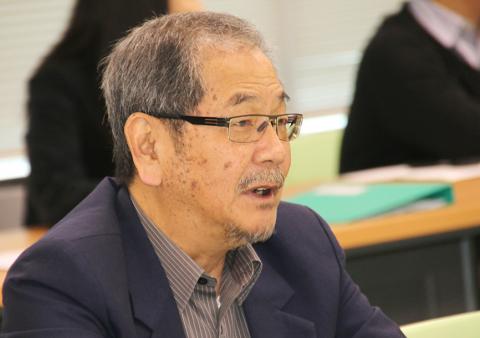Former Democratic Progressive Party (DPP) secretary-general Wu Nai-jen (吳乃仁) yesterday said that he would quit the party — as well as a clique of former New Tide faction members, of which he is an influential member — to protest the nomination of Executive Yuan Secretary-General Cho Jung-tai (卓榮泰) for party chairperson.
Wu made the remarks in an instant messaging group used by the clique.
He singled out Taoyuan Mayor Cheng Wen-tsan (鄭文燦), a member of the group, as the source of his frustration, saying that Cheng’s endorsement of Cho after Cho last month lashed out at DPP Legislator Tuan Yi-kang (段宜康), another member of the clique, showed that Cheng did not value his 30 years of friendship with Tuan.

Photo: Liu Hsin-de, Taipei Times
The move would negatively affect Tuan’s role as one of the group’s leading figures, Wu added.
Tuan last month sparked a dispute with Cho after he slammed his palm on the podium during a question-and-answer session at the Legislative Yuan when grilling Premier William Lai (賴清德) over DPP policies that had drawn public criticism, which he said led to the party’s losses in the Nov. 24 nine-in-one elections.
Cho called Tuan’s harsh criticism of the party “completely unacceptable” and asked whether the DPP had been wrong to push pension reforms for retired civil servants, military personnel and public-school teachers.
Legislation to eliminate a much-criticized 18 percent preferential interest rate for the retirees in six years was led by Tuan, Cho said.
The party “took a wrong step” while reflecting after its election losses, as did President Tsai Ing-wen (蔡英文) when she met with Taipei Mayor Ko Wen-je (柯文哲) on Thursday, Wu said.
He added that while those errors cause him pain, his endorsement of Cho was the last straw.
“The New Tide faction is a failed project. It cannot speak its mind, even when the party is going through a crisis, which proves that it no longer has a reason to exist,” Wu said.
The DPP in 2006 dissolved its factions, but many continue to exist unofficially.
Asked for comment while accompanying Cho to register for the DPP chairperson election, Cheng said: “I have not learned of that situation.”
Cho said that Wu is an “amiable and experienced” DPP member who he hopes would remain in the party.
Additional reporting by Sean Lin and CNA

ACTION PLAN: Taiwan would expand procurement from the US and encourage more companies to invest in the US to deepen bilateral cooperation, Lai said The government would not impose reciprocal tariffs in retaliation against US levies, President William Lai (賴清德) said yesterday, as he announced five strategies to address the issue, including pledging to increase Taiwanese companies’ investments in the US. Lai has in the past few days met with administrative and national security officials, as well as representatives from various industries, to explore countermeasures after US President Donald Trump on Wednesday last week announced a 32 percent duty on Taiwanese imports. In a video released yesterday evening, Lai said that Taiwan would not retaliate against the US with higher tariffs and Taiwanese companies’ commitments to

Intelligence agents have recorded 510,000 instances of “controversial information” being spread online by the Chinese Communist Party (CCP) so far this year, the National Security Bureau (NSB) said in a report yesterday, as it warned of artificial intelligence (AI) being employed to generate destabilizing misinformation. The bureau submitted a written report to the Legislative Yuan in preparation for National Security Bureau Director-General Tsai Ming-yen’s (蔡明彥) appearance before the Foreign Affairs and National Defense Committee today. The CCP has been using cognitive warfare to divide Taiwanese society by commenting on controversial issues such as Taiwan Semiconductor Manufacturing Co’s (TSMC, 台積電) investments in the

HELPING HAND: The steering committee of the National Stabilization Fund is expected to hold a meeting to discuss how and when to utilize the fund to help buffer the sell-off The TAIEX plunged 2,065.87 points, or 9.7 percent, to close at 19,232.35 yesterday, the highest single-day percentage loss on record, as investors braced for US President Donald Trump’s tariffs after an extended holiday weekend. Amid the pessimistic atmosphere, 945 listed companies led by large-cap stocks — including Taiwan Semiconductor Manufacturing Co (TSMC, 台積電), Hon Hai Precision Industry Co (鴻海精密) and Largan Precision Co (大立光) — fell by the daily maximum of 10 percent at the close, Taiwan Stock Exchange data showed. The number of listed companies ending limit-down set a new record, the exchange said. The TAIEX plunged by daily maxiumu in just

‘COMPREHENSIVE PLAN’: Lin Chia-lung said that the government was ready to talk about a variety of issues, including investment in and purchases from the US The National Stabilization Fund (NSF) yesterday announced that it would step in to staunch stock market losses for the ninth time in the nation’s history. An NSF board meeting, originally scheduled for Monday next week, was moved to yesterday after stocks plummeted in the wake of US President Donald Trump’s announcement of 32 percent tariffs on Taiwan on Wednesday last week. Board members voted to support the stock market with the NT$500 billion (US$15.15 billion) fund, with injections of funds to begin as soon as today. The NSF in 2000 injected NT$120 billion to stabilize stocks, the most ever. The lowest amount it